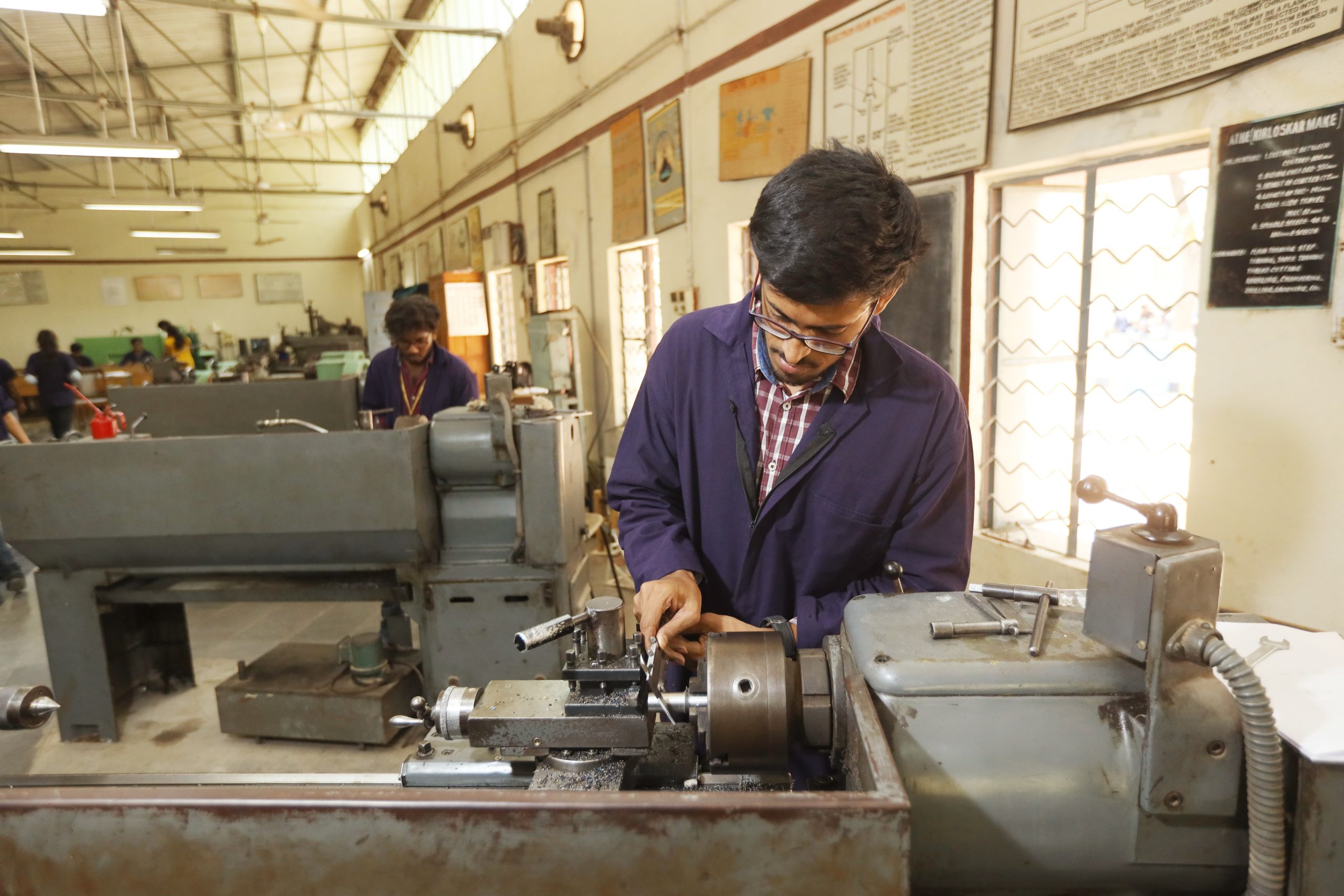
We’re talking education that builds the future
Eligibility | Fees and Financial Assistance | Facts & Figures| HOD Message| Faculty |Board of Studies| Departmental Committees | Announcement | MoUs | Syllabus | Open Electives | Time Tables | UG with Honours | Additional Minor Engineering | Value Added Courses | Internships | Research | Infrastructure | Documents | Events
The mechanical engineering department at CBIT always strives to stay at the forefront of technological innovation. Our department lives and swears by technological developments that are shaking the very foundations of conventional wisdom. If there is an existing solution to a real life problem in the field of mechanical engineering, our students know of it. And if there doesn’t exist any, you can find them engrossed in finding one.
UG
PG
To be the destination for aspiring young minds to become globally competitive,enlightened, innovative, immediate contributors to the industry and successful in higher studies in the field of mechanical engineering.
1.To impart quality and innovative education in mechanical engineering with basic and specialised training, internships to meet the current and emerging needs of the industry.
2.To prepare the students for successful professional career by inculcating ethical, entrepreneurial and leadership qualities.
3.To foster Research and Development environment by disseminating knowledge and technology by involving the students in publications, sponsored projects and consultancy.
Under the able leadership of Dr.P.Prabhakar Reddy, students of the mechanical engineering department have been consistently getting placement in their dream companies for the past few years.
After Four years of graduation graduates will have
The graduates will be able to
The graduating students from Production Engineering will have a widespread knowledge in basic sciences and fundamentals of Production engineering and will be able to solve application level problems pertaining to society.
The graduating students from mechanical engineering will have knowledge in core areas in Production Engineering like Design Engineering, Industrial Engineering, Manufacturing Engineering, and Thermal Engineering.
The programme prepares the graduates to acquire competency for research in core areas and also in interdisciplinary research activities like environment & sustainability.
The graduating students from Production Engineering will inculcate professional & ethical values, team work, leadership skills, moral responsibility, industrial relations and communication skills.
The graduating students from Production Engineering will be enriched in project, finance management and technical knowhow skills.
Fundamental knowledge of the theoretical background for the applied technologies and methods applied in Production Engineering, including conventional and CAD/CAM areas
Ability to think and work in a problem oriented, project oriented and in an inter-disciplinary way
Ability to work independently as well as in teams and get the opportunity to learn leadership and entrepreneurship qualities.
Engineering Knowledge:
Apply the knowledge of mathematics, science, engineering fundamentals, and an engineering specialization for the solution of complex engineering problems
Problem analysis:
Identify, formulate, research literature, and analyse complex engineering problems reaching substantiated conclusions using first principles of mathematics, natural sciences, and engineering sciences.
Design/development of solutions:
Design solutions for complex engineering problems and design system components or processes that meet the specified needs with appropriate consideration for public health and safety, and cultural, societal, and environmental considerations.
Conduct investigations of complex problems:
Use research-based knowledge and research methods including design of experiments, analysis and interpretation of data, and synthesis of the information to provide valid conclusions.
Modern tool usage:
Create, select, and apply appropriate techniques, resources, and modern engineering and IT tools, including prediction and modelling to complex engineering activities, with an understanding of the limitations.
The engineer and society:
Apply reasoning informed by the contextual knowledge to assess societal health, safety, legal, and cultural issues and the consequent responsibilities relevant to the professional engineering practice.
Environment and sustainability:
Understand the impact of the professional engineering solutions in societal and environmental contexts, and demonstrate the knowledge of and need for sustainable development.
Ethics:
Apply ethical principles and commit to professional ethics and responsibilities and norms of the engineering practice.
Individual and team work:
Function effectively as an individual, and as a member or leader in diverse teams, and in multidisciplinary settings.
Communication:
Communicate effectively on complex engineering activities with the engineering community and with the society at large, such as, being able to comprehend and write effective reports and design documentation, make effective presentations, and give and receive clear instructions.
Project management and finance:
Demonstrate knowledge and understanding of the engineering and management principles and apply these to one’s own work, as a member and leader in a team, to manage projects and in multidisciplinary environments.
Life-long learning:
Recognize the need for, and have the preparation and ability to engage in independent and life-long learning in the broadest context of technological change.
Prepare Graduates with Good Analytical, Computational and Experimental Skills to Design and Develop Energy Efficient Systems for Sustainable Development.
Prepare Graduates with High Level of Technical Competency combined with Research and Complex Problem Solving Ability to Generate Innovative Solutions in Thermal Engineering and allied areas.
Pursue Lifelong Learning for Career and Professional Growth with a Concern for Society and Environment.
Apply domain knowledge of thermal and fluid sciences to solve engineering problems with the help of advanced technology.
Develop alternative energy sources for sustainable growth.